|
|
|
Sort Order |
|
|
|
Items / Page
|
|
|
|
|
|
|
| Srl | Item |
| 1 |
ID:
188059


|
|
|
|
|
| Summary/Abstract |
While conflict, crime, and terrorism are persistent geopolitical and human security threats, climate change can be a threat multiplier, affecting geopolitical stability on local, regional, and global scales. This paper provides a qualitative assessment of the literature and geopolitical trends related to climate change, migration, and ethnocentrism in order to evaluate the current situation and future potentials for climate-driven conflict, crime, terrorism, and ethnocentric extremism. The paper concludes that as climate change becomes a major driver of environmental degradation, natural disasters, mass migrations, and urbanization, this will escalate the impetus for violence against migrants, the exploitation of migrants, and anti-migrant politics. Potential implications in terms of terrorism and extremism are discussed.
|
|
|
|
|
|
|
|
|
|
|
|
|
|
|
|
| 2 |
ID:
172337


|
|
|
|
|
| Summary/Abstract |
Existing research on conflict-related sexual violence focuses on the motivations of perpetrators and effects on survivors. What remains less clear is how postconflict societies respond to the hardships survivors face. In survey experiments in Bosnia, we examine public support for financial aid, legal aid, and public recognition for survivors. First, we find a persistent ethnocentric view of sexual violence, where respondents are less supportive when the perpetrator is identified as co-ethnic and survivors are perceived as out-groups. Second, respondents are less supportive of male survivors than female survivors, which we attribute to social stigmas surrounding same-gender sexual activity. Consistent with our argument, those who are intolerant of homosexuality are especially averse to providing aid to male survivors. This study points to the long-term challenges survivors face due to ethnic divisions and social stigmatization from sexual violence.
|
|
|
|
|
|
|
|
|
|
|
|
|
|
|
|
| 3 |
ID:
139370
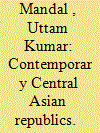

|
|
|
|
|
| Summary/Abstract |
Therefore, national policy in Central Asian States should shift from ethnocentrism to civic nationalism based on a common set of values and shared homeland. Instead of putting emphasis on historical roots, which are not only a source of pride for achievements in the past, but also a source of traumas and inter-ethnic conflicts, a focus on the contemporary achievements of the nations would be more beneficial.
|
|
|
|
|
|
|
|
|
|
|
|
|
|
|
|
| 4 |
ID:
029049
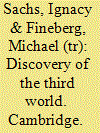

|
|
|
|
|
| Publication |
Cambridge, MIT Press, 1976.
|
| Description |
xi, 287p.
|
| Standard Number |
0262191458
|
|
|
|
|
|
|
|
|
|
|
|
Copies: C:1/I:0,R:0,Q:0
Circulation
| Accession# | Call# | Current Location | Status | Policy | Location |
| 016864 | 301.091724/SAC 016864 | Main | On Shelf | General | |
|
|
|
|
| 5 |
ID:
115279
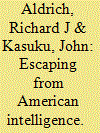

|
|
|
|
|
| Publication |
2012.
|
| Summary/Abstract |
The United States and its closest allies now spend over $100 billion a year on intelligence. Ten years after 9/11, the intelligence machine is certainly bigger-but not necessarily better. American intelligence continues to privilege old-fashioned strategic analysis for policy-makers and exhibits a technocratic approach to asymmetric security threats, epitomized by the accelerated use of drone strikes and data-mining. Distinguished commentators have focused on the panacea of top-down reform, while politicians and practitioners have created entirely new agencies. However, these prescriptions for change remain conceptually limited because of underlying Anglo-Saxon presumptions about what intelligence is. Although intelligence is a global business, when we talk about intelligence we tend to use a vocabulary that is narrowly derived from the experiences of America and its English-speaking nebula. This article deploys the notion of strategic culture to explain why this is. It then explores the cases of China and South Africa to suggest how we might begin to rethink our intelligence communities and their tasks. It argues that the road to success is about individuals, attitudes and cultures rather than organizations. Future improvement will depend on our ability to recognize the changing nature of the security environment and to practise the art of 'intelligence among the people'. While the United States remains the world's most significant military power, its strategic culture is unsuited to this new terrain and arguably other countries have adapted to it better.
|
|
|
|
|
|
|
|
|
|
|
|
|
|
|
|
| 6 |
ID:
030148


|
|
|
|
|
| Publication |
Washington D.C., American Enterprise Institute for Public Policy Research, 1985.
|
| Description |
67p.
|
| Standard Number |
0844735698
|
|
|
|
|
|
|
|
|
|
|
|
Copies: C:1/I:0,R:0,Q:0
Circulation
| Accession# | Call# | Current Location | Status | Policy | Location |
| 025585 | 327.7301724/WIA 025585 | Main | On Shelf | General | |
|
|
|
|
| 7 |
ID:
076116


|
|
|
| 8 |
ID:
138078
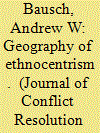

|
|
|
|
|
| Summary/Abstract |
Hammond and Axelrod use an evolutionary agent-based model to explore the development of ethnocentrism. They argue that local interactions permit groups, relying on in-group favoritism, to overcome the Nash equilibrium of the prisoner’s dilemma and sustain in-group cooperation. This article shows that higher levels of cooperation evolve when groups are dropped from the model, breaking the link between ethnocentrism and cooperation. This article then generalizes Hammond and Axelrod’s model by parameterizing the underlying geographical assumptions they make about the evolutionary environment. This more general model shows that their findings are sensitive to these assumptions and that small changes to the assumed geography of reproduction significantly affect the probabilities of finding ‘‘ethnocentric’’ behaviors. The model presented here indicates that it is not local interactions, per se, but settings where interactions are highly likely to be with close relatives that lead to ‘‘ethnocentrism’’ as modeled by Hammond and Axelrod.
|
|
|
|
|
|
|
|
|
|
|
|
|
|
|
|
| 9 |
ID:
122952


|
|
|
|
|
| Publication |
2013.
|
| Summary/Abstract |
How do Chinese scholars and students residing in the United States view the United States? This study tries to answer this question using a unique dataset from the United States. It also seeks to identify the determinants of Chinese migrants' attitudes towards the United States, especially with regard to overseas socialization. On the whole, the results indicate that Chinese scholars and students in the United States have a mostly favourable attitude towards America and remain positive towards China. Their values, overseas experience, and other factors have important influences on their feelings towards the United States. We find that most respondents have a positive attitude towards the United States, as regards both its general national image and diverse images, including political institutions, the economy, and the environment. We also find that this group of Chinese respondents maintains a strong attachment to China and has a conservative attitude towards China's future growth. Our results suggest that values such as nationalism and ethnocentrism have significant influence on individuals' feelings towards the United States.
|
|
|
|
|
|
|
|
|
|
|
|
|
|
|
|
| 10 |
ID:
165887
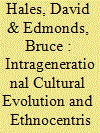

|
|
|
|
|
| Summary/Abstract |
Ethnocentrism denotes a positive orientation toward those sharing the same ethnicity and a negative one toward others. Previous models demonstrated how ethnocentrism might evolve intergenerationally (vertically) when ethnicity and behavior are inherited. We model short-term intragenerational (horizontal) cultural adaptation where agents have a fixed ethnicity but have the ability to form and join fluid cultural groups and to change how they define their in-group based on both ethnic and cultural markers. We find that fluid cultural markers become the dominant way that agents identify their in-group supporting positive interaction between ethnicities. However, in some circumstances, discrimination evolves in terms of a combination of cultural and ethnic markers producing bouts of ethnocentrism. This suggests the hypothesis that in human societies, even in the absence of direct selection on ethnic marker–based discrimination, selection on the use of fluid cultural markers can lead to marked changes in ethnocentrism within a generation.
|
|
|
|
|
|
|
|
|
|
|
|
|
|
|
|
| 11 |
ID:
112512
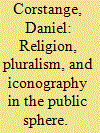

|
|
|
|
|
| Publication |
2012.
|
| Summary/Abstract |
This article examines mass public discourse on religion and pluralism in diverse societies. It argues that religion enters the public sphere by defining countervailing narratives about sectarianism, which is exclusive and divisive, and ecumenicism, which is inclusive and unifying. Most empirical studies focus on elites as the producers of discourse and ignore the regular people who comprise the "real" public. In contrast to prior work, this article systematically examines mass public discourse, with Lebanon, a religiously diverse developing world society, as its research venue. It uses a novel combination of original survey data and publicly displayed religious and political iconography to study the exchange of ideas about religion and pluralism among the mass public. It shows that sectarian discourse articulates ethnocentric and antiplural statements, whereas ecumenicism, by contrast, mitigates ethnocentrism and valorizes pluralism.
|
|
|
|
|
|
|
|
|
|
|
|
|
|
|
|
| 12 |
ID:
147937
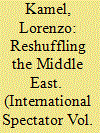

|
|
|
|
|
| Summary/Abstract |
The Middle East is experiencing one of the darkest periods in its history and a new regional order is still far from being established. Yet, it appears increasingly clear that few matters will affect its developments more than the ongoing regional demographic dynamics. The region’s history and spatial background provide a framework for approaching these epochal shifts and critically examining the ‘ethnic stabilisation’ thesis, which interprets current demographic movements as a kind of normalisation of the region’s ‘original’ demographics. Instead of this ‘medievalization of the Middle East’, many people in the region are keen on ‘getting back into history’ and ‘regaining possession’ of their multifaceted past: a powerful antidote to the geopolitical reductionism so popular nowadays.
|
|
|
|
|
|
|
|
|
|
|
|
|
|
|
|
| 13 |
ID:
174793


|
|
|
|
|
| Summary/Abstract |
Northeast India, a ‘zipper region’ that gives impetus to Southeast Asian and Himalasian studies, is marked by complexities and ambiguities. The paper examines the multiple identity construction in contemporary Assam, the central state of this region and seeks to recover the other experiences that make ethnic life-world possible while challenging the ethnocentric discourses—in academia, politics, public and social movements. Acknowledging the presence of common or possibly universal processes behind the production of such discourses, it aims to interrogate the factors that cut across socio-cultural, political-economical or ecological dimensions. It further examines the multiple discourses and narratives that makes that social possible in the region. In doing so, it locates the strategic positioning of such discourses and how they deal with Indian nation-state and beyond. This paper in essence is interested in the question of possibility of various discourses—as a question of post-history.
|
|
|
|
|
|
|
|
|
|
|
|
|
|
|
|
| 14 |
ID:
059381
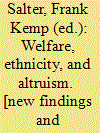

|
|
|
|
|
| Publication |
London, Frank Cass, 2004.
|
| Description |
xxv, 341p.
|
| Standard Number |
0714683523
|
|
|
|
|
|
|
|
|
|
|
|
Copies: C:1/I:0,R:0,Q:0
Circulation
| Accession# | Call# | Current Location | Status | Policy | Location |
| 049239 | 305.8/SAL 049239 | Main | On Shelf | General | |
|
|
|
|
| 15 |
ID:
147652


|
|
|
|
|
| Summary/Abstract |
This paper asserts that ethnically dominated political citizenship defines the deep structure of the Malaysian regime, in congruence with ethnic Malay social demand. This, rather than the commonly suggested electoral gerrymander, prevents partisan turnovers because opposition parties, tied to the same congruence, offer no strategic gains to alter the status quo.
|
|
|
|
|
|
|
|
|
|
|
|
|
|
|
|
|
|
|
|
|